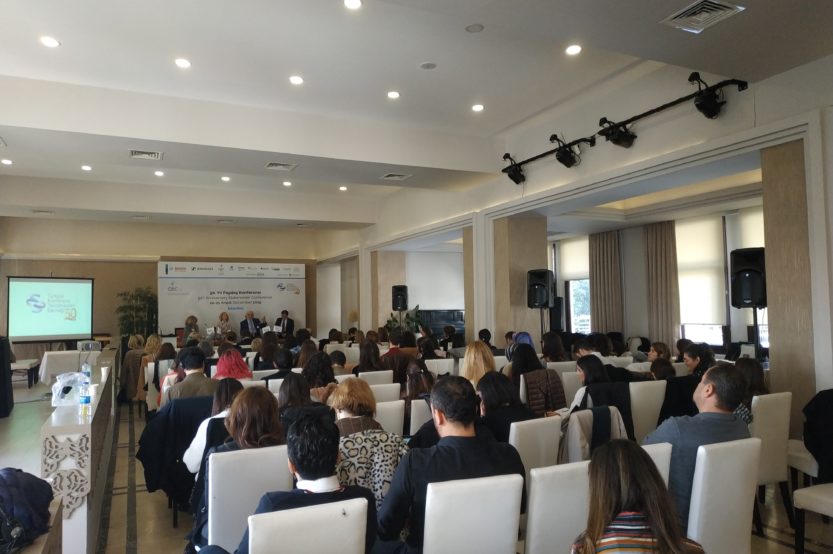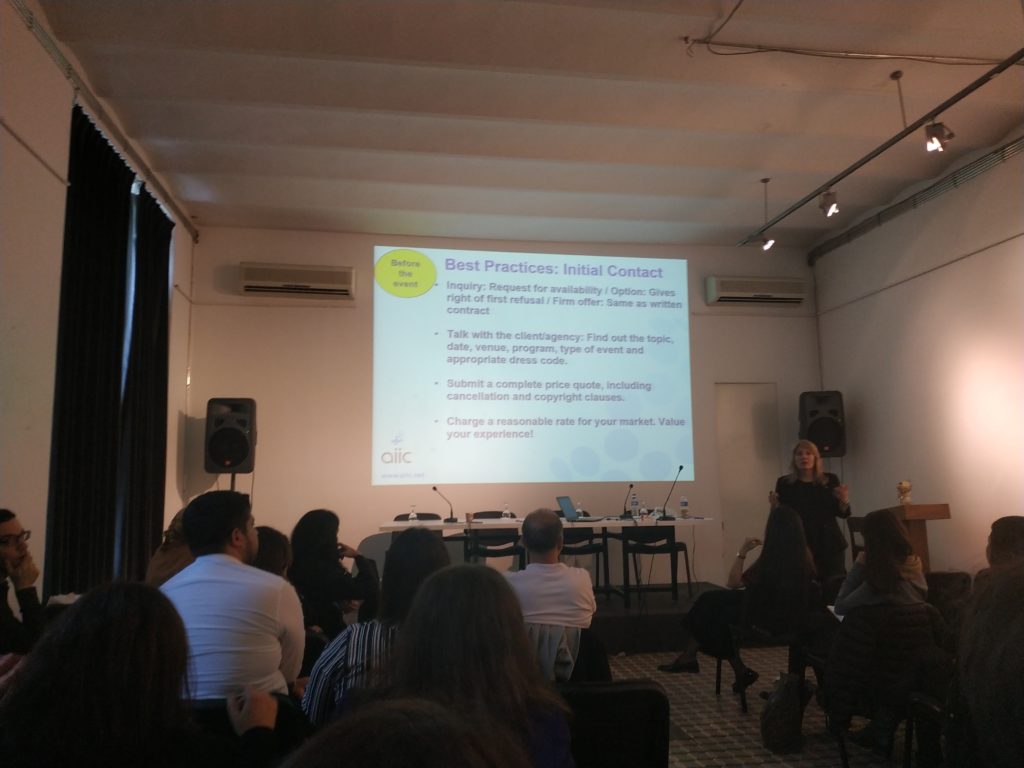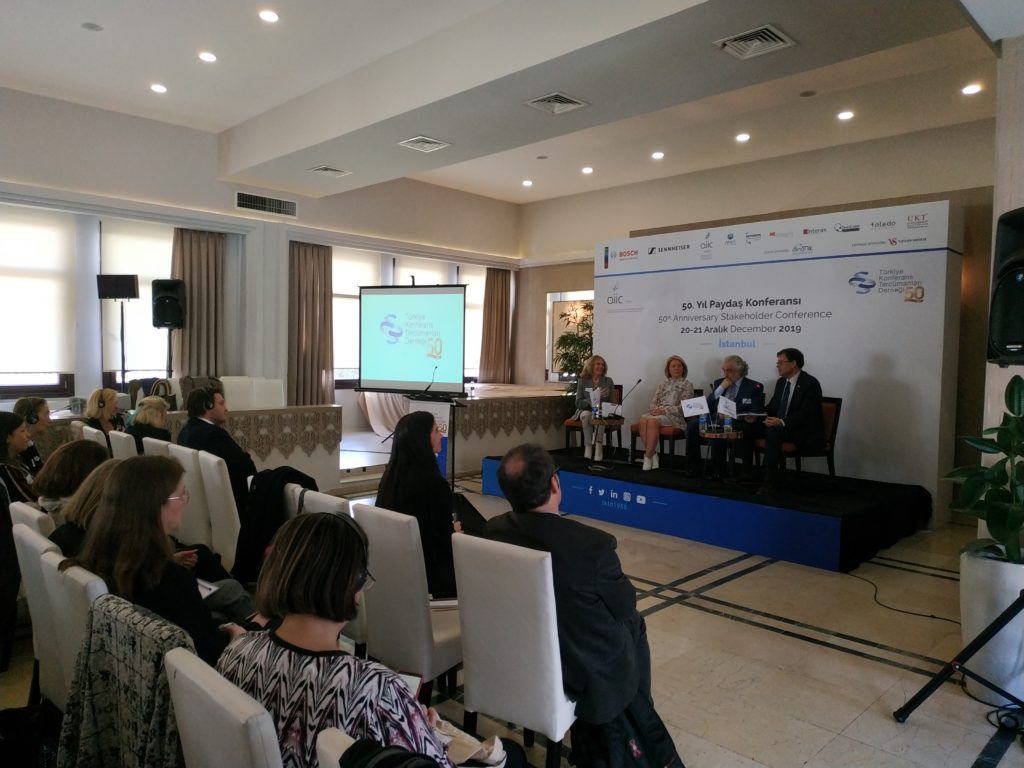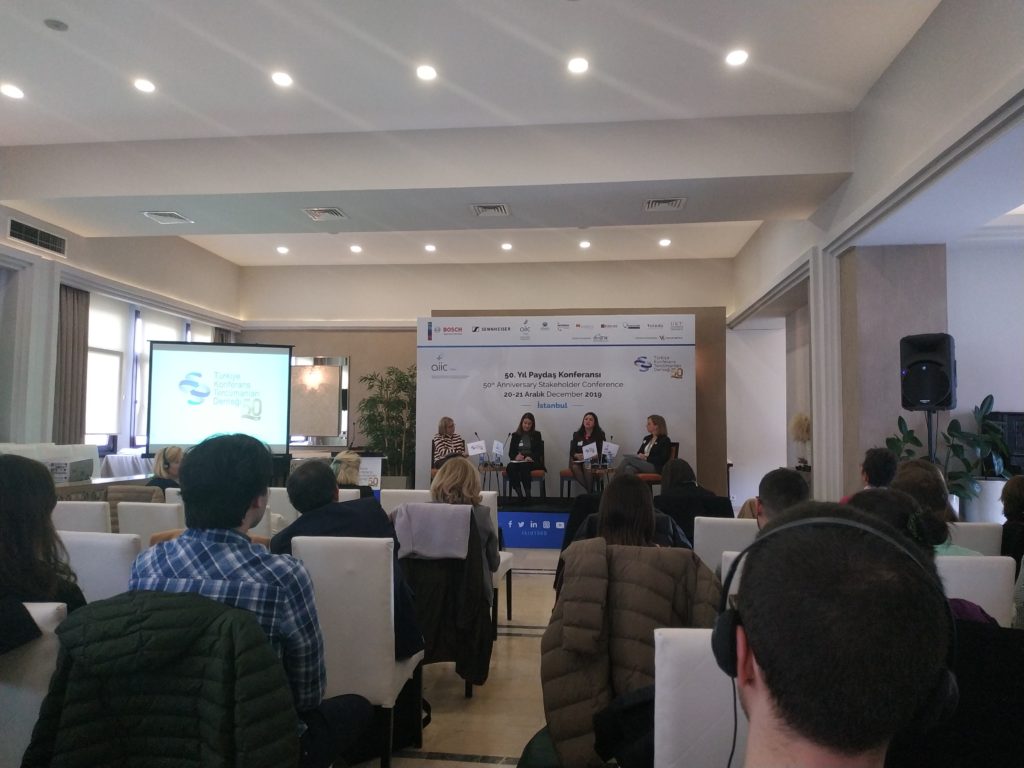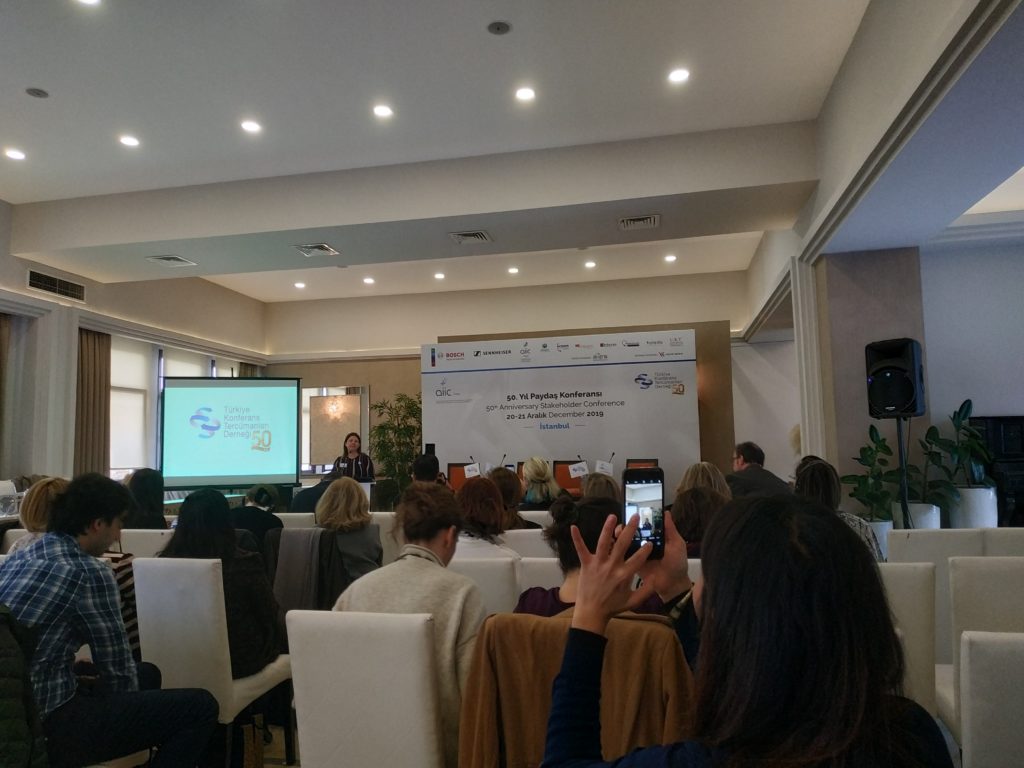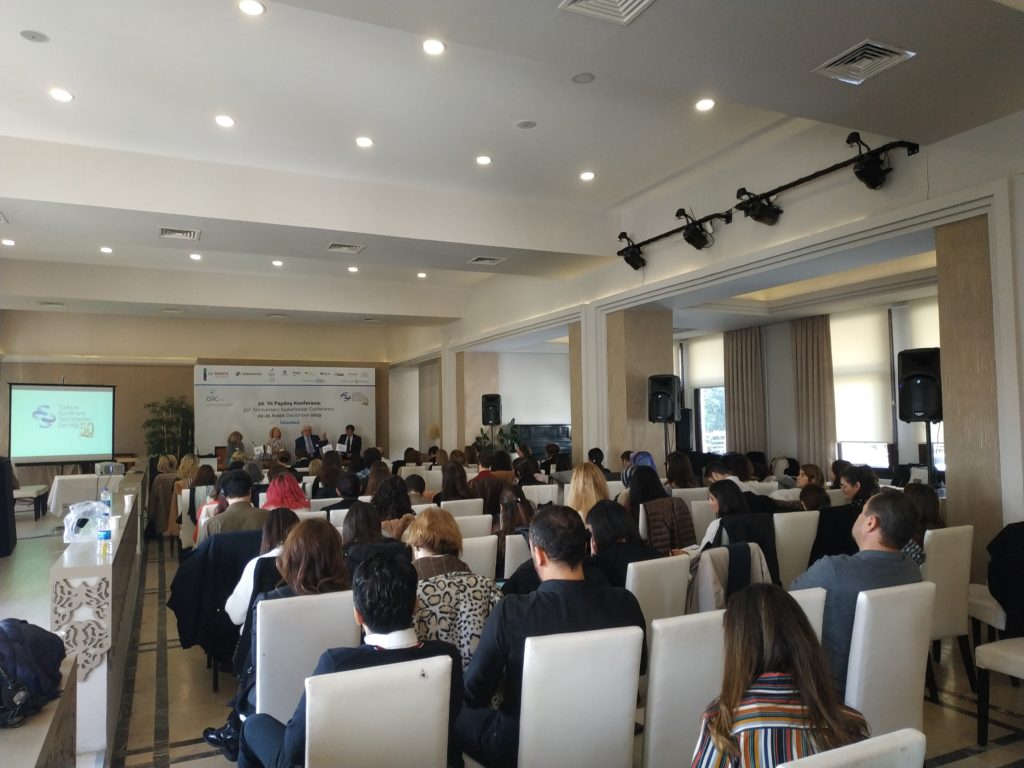So, this year marked the 50th anniversary for The Conference Interpreters Association of Turkey, covered by us here. Following up the AIIC VEGA Network & TKTD Istanbul conference on the 19th, TKTD held a joint two-day conference with the International Association of Conference Interpreters (AIIC) on 20-21 December, welcoming all actors of the effulgent profession that is conference interpreting – What better way to say goodbye to the 50th year of TKTD?
The seats were no less than packed with intellectual minds. The two-day conference allowed many stakeholders to voice their side of the story – from interpreting trainers to Artifical Intelligence (A.I.) developers, national & international association members to students, academics from Translation Studies and Translation & Interpreting departments to representatives from technical equipment companies, and well: our beloved conference interpreters.
“The Most Important Skill of Tomorrow Will Be Creativity”
After the opening notes by the TKTD President Bahar Çotur, AIIC Turkey Regional Secretary Verda Kıvrak and the ICVB / TUGEV General Manager Dr. Cemil Hakan Kılıç, day 1 set off with an inspirational speech by programmer Zafer Demirkol on A.I. and its use in conference interpreting (CI).
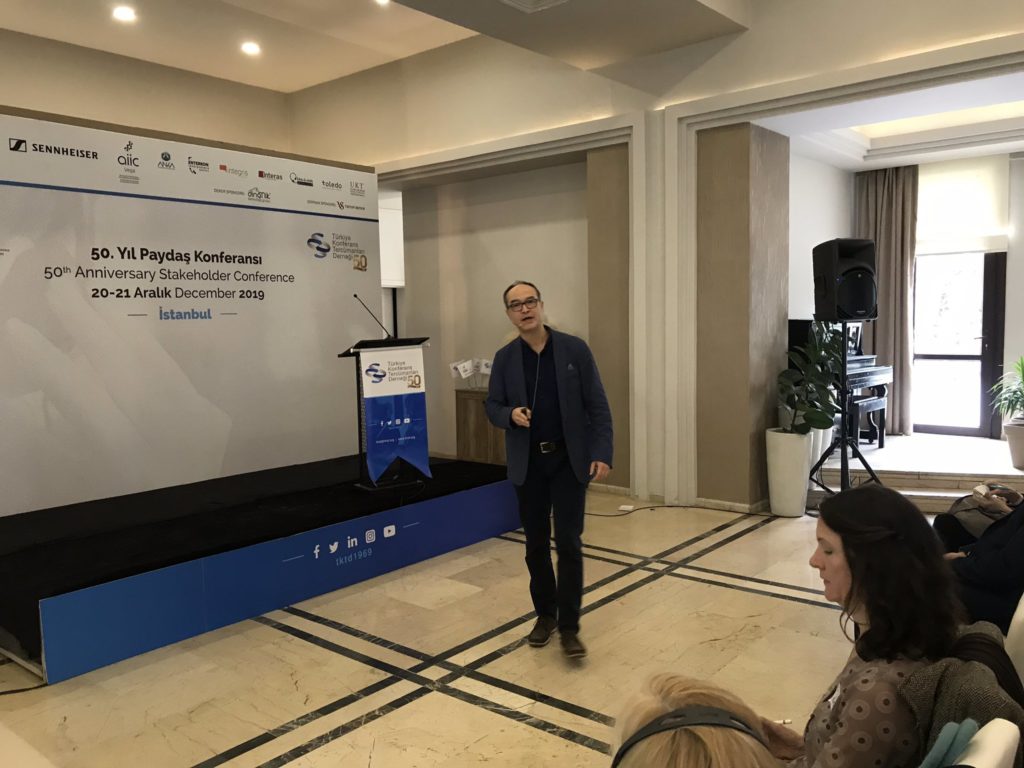
Demirkol referred to a paradigm shift from data-based programming towards a rule-based machine learning approach (RBML) that would speed up the rate at which A.I. can be taught to perform simultaneous interpreting. Though Demirkol declared A.I. would not replace humans for another thirty years ,as even with RBML more data and more processing power were needed; later on he shared with the attendees a breakthrough by China’s Baidu performing STACL (Simultaneous Translation with Anticipation and Controllable Latency) with remarkable success – which we leave to your judgment.

Sub-title in italics: “Why Do We Train Judges When We All Know the Laws? Why Do We Train Football Coaches When We All Know How To Play Football?”
Next up the floor was yielded to Ildiko Horvath, President
of the European Masters in Conference Interpreting. Horvath touched upon the
standards and principles of CI training in Europe.
“Why do we train judges when we all know the laws? Why do we train football
coaches when we all know how to play football?” Horvath asked to justify the
training of Cıs. Quite understandable, we’d say.
Among the many gifts bestowed upon the subjects of EMCI’s training are Interpreting skills & competences, techniques & strategies, information processing in interpreting sessions, mental capacity management, attention sharing & dividing, gisting, chunking, monitoring mental processes and output, note taking, booth manners and anticipation of speech, professional language skills, professional bilingualism, mental lexicon, linguistic & speech behaviour, professional awareness, embracing the metalanguage, professional ethics, codes & behaviour.
67 Undergraduate Programs in Turkey
Following Ildiko Horvath’s delivery on the training of CIs,
Prof. Ebru Diriker from Boğaziçi University stepped up to address the training
of our CIs in Turkey.
“The first undergraduate program of Turkey was launched in Hacettepe University
in 1982, followed by Boğaziçi University in 1983.” Diriker informed: “There are
67 undergrad programs in Turkey today; 33 English-Turkish, 9 Turkish-German, 8
Arabic-Turkish, 4 Russian-Turkish, and 3 programs with more than 2 languages.”
Continuing on with the academic side of the environment surrounding CIs, it is
fair to say she left the students, academics and all the others involved in the
Academy in one way or another more than pleased.
Day 1 was finalised with a delivery by AIIC’s VEGA Network Coordinator Claudia Cereghino (you can read here about her work) about “initiation to the profession” and a Q&A session.
Day 2
“The Better the Conditions of a Profession, The Less Need For An Association”
The second day launched off with a notable speech from the President of AIIC Uroš Peterc on the significance of professional organisations and cooperation between national and international associations. What associations you say?
“As a member of the association (AIIC), the first thing you get is recognition as a professional” he propounded. Sharing an anecdote about the attempted confiscation of a consecutive interpreter’s notes in Helsinki, he added: “The better the conditions of a profession, the less need for an association.”
Peterc gave up the mike with a fair message:
“Interpretation has to be excellent. Mediocrity in interpreting is useless.”
All in all, it was a marvellous experience to listen to the many stakeholders of the Conference Interpreting world. On that note, the smashing of buttons shall cease after a list of notable mentions:
Highlights & Quotes from the Rest of the Day
– Verda Kıvrak, Turkey Regional Secretary of AIIC and TKTD Board Member
About the cooperation between national and international organisations: “AIIC & TKTD follow the same ideals: excellence in conference interpreting.”
Regarding the importance of solidarity and professional associations:
“Much like the aerialist that catches another aerialist whilst mid-air, the interpreter aids the interpreter; the safety net below them are the professional associations.”
To students & the newcomers to the profession: “The path you will be setting on in this era will be much different from the path we followed in the last century.”
– Sofia Proku, AIIC Greece and Cyprus Region Representative
On the status of Greek CI circles: “Greece has no professional association so far as interpreting is concerned. We are working on it. Turkey and Italy are the two giants and role models for us.”
On the conditions of Greek interpreters: “For a Greek interpreter to make a living, they must either live in Brussels or have an EU certificate.”
– Songül Kurulman, TETSED Board Member & Technical Equipment Provider Representative
On solidarity: “Stakeholders must work hand in hand to ensure an elevation in mutual understanding as well as the quality of work.”
– Klaus Ziegler, Conference Interpreter and Remote Simultaneous Interpretation Expert
About the matter of ‘man versus machine’: “Even the developers of AI solutions say that they are quite far away from being near human interpreting.”
– Zeynep Yanat Kırçal, Conference Interpreter
Regarding the demand for RSI: “The clients prefer Remote Simultaneous Interpreting as it is more affordable.”
The downsides of RSI: “What common grounds can we meet on when everyone else is a world apart?”
Problems in RSI: “We are expected to deliver excellently even in the cases of syllables, words or whole sentences being lost because of weak internet connection.”
– Ahu Latifoğlu Doğan, Conference Interpreter
On RSI companies: “Remote Simultaneous Interpreting companies are aware that they should also be pleasing the interpreters.”
Problems in RSI: “The prominent problem in RSI is internet connection; as the person responsible for providing infrastructure you cannot blame any other stakeholders.”
– Cihan Ünlü, Conference Interpreter, Research Assistant, T-1 Co-founder
On RSI connection problems: “As quick response time in interpreting is quite significant, perhaps ISPs could be granted a seat in the upcoming TKTD conferences.”

